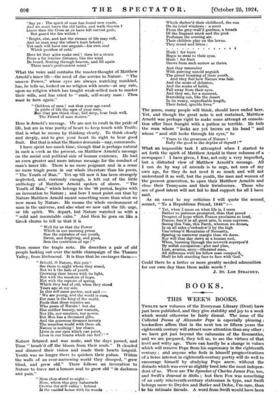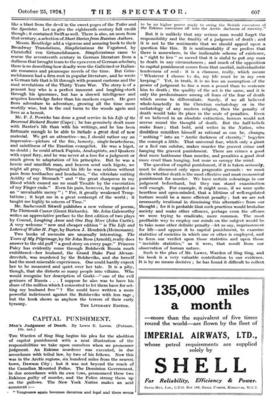BOOKS.
THIS WEEK'S BOOKS.
TwELvE new volumes of the Everyman Library (Dent) have just been published, and they give stability and joy to a week which would otherwise be fairly dismal. The issue of the Collected Poems of Alexander Pope is especially pleasing : booksellers affirm that in the next ten or fifteen years the eighteenth century will attract more attention than any other ; we have got just beyond the calumnies of the Romantics, and we are prepared, they tell us, to see the virtues of that level and witty age. There can hardly be a change in values which will remove Pope from his supremacy in the eighteenth century ; mid anyone who feels in himself prognostications of a fierce interest in eighteenth-century poetry will do well to encourage himself by studying Pope anew, without the distaste which was ever so slightly bred into the most indepen- dent of us. There are The Speeches of Charles James Pox, too, and Swift's Journal to Stella'; but then Fox was something of an early nineteenth-century statesman in type, and Swift belongs more to Dryden and Butler and Defoe, I'm sure, than to his intimate friends. A .word. from. Swift would have been
like a blast from the devil in the sweet pages of the Taller and the Spectator. Let us give the eighteenth century full credit though ; it contained Swift as well. There is also, an aeon from that century, a selection of Short Stories from Russian Authors.
Messrs. Routledge add a vigorous and amusing book to their Broadway Translations, Simplicissimus the Vagabond, by Christoffel von Grimmelshausen. Simplicissimus came to rescue the seventeenth century in German literature from a dullness that brought tears to the eyes even of German scholars; there is no describing how deadly were the Gall icized or Italian- ate romances and picaresque novels of the time. But Grim- melshausen had a firm root in popular literature, and he wrote a German tale that is lit through with peasant customs and the mad revolutions of the Thirty Years War. The story is of a peasant boy who is a perfect innocent and laughing-stock through his ignorance, but has a shrewd intelligence and acquires knowledge faster than his mockers expect. He goes from adventure to adventure, growing all the time more worldly wise, but in the end turns to the woods again and lives as a hermit.
Mr. F. J. Powicke has done a good service in his Life of the Reverend Richard Baxter (Cape) ; he has genuinely dealt more with Baxter's life than with his writings, and he has been fortunate enough to be able to include a great deal of new material. We get an attractive—no, I should rather say an impressive—picture of the fire, honesty, single-heartedness, and saintliness of the Erastian evangelist. He was a bigot, no doubt ; he could attack Papists, Anabaptists, and Quakers with equal fury, and he was never at a loss for a judgment or much given to adaptation of his principles. But he was a heroic and unselfish man, and heaven send such bigots, we might all pray. Throughout his life he was seldom without pain from toothaches and headaches, "the vitriolate cutting Acidity of my Stomach" and "the great sharpness in my Blood which caused me no small Trouble by the excoriation of my Finger ends." Even his pain, however, he regarded as an " unvaluable mercy " ; "For, it greatly weakened Temp- tations; it kept me in a great contempt of the world ; it taught me highly to esteem of Time."
Mr. Sacheverell Sitwell publishes a new volume of poems, The Thirteenth Caesar (Grant Richards). Mr. John Galsworthy writes an appreciative preface to the first edition of two plays by Conrad, Laughing Anne and One Day More (John Castle). A very welcome "new and cheaper edition" is The Life and Letters of Walter H. Page, by Burton J. Hendrick (Heinemann).
Two books of memoirs are unusually interesting. The Years of My Pilgrimage, by Sir John Ross (Arnold), really does answer to the old puff" a good story on every page." Princess Paley has evidently come through Bolshevik Russia much embittered—her husband, the Grand Duke Paul Alexan- drovitch, was murdered by the Bolsheviks, and she herself had the most miserable experiences. One could hardly expect her to be measured and quiet over her tale. It is a pity, though, that she distorts so many people into villains. Who would recognize her description of Gorki—" one of the evil geniuses of Russia . . . I suppose he also was to have his share of the million which I consented to let them have for set- ting my husband free " ? She could have written a more powerful indictment against the Bolsheviks with less rage ; but the book shows us anyhow the terrors of their early



























































 Previous page
Previous page